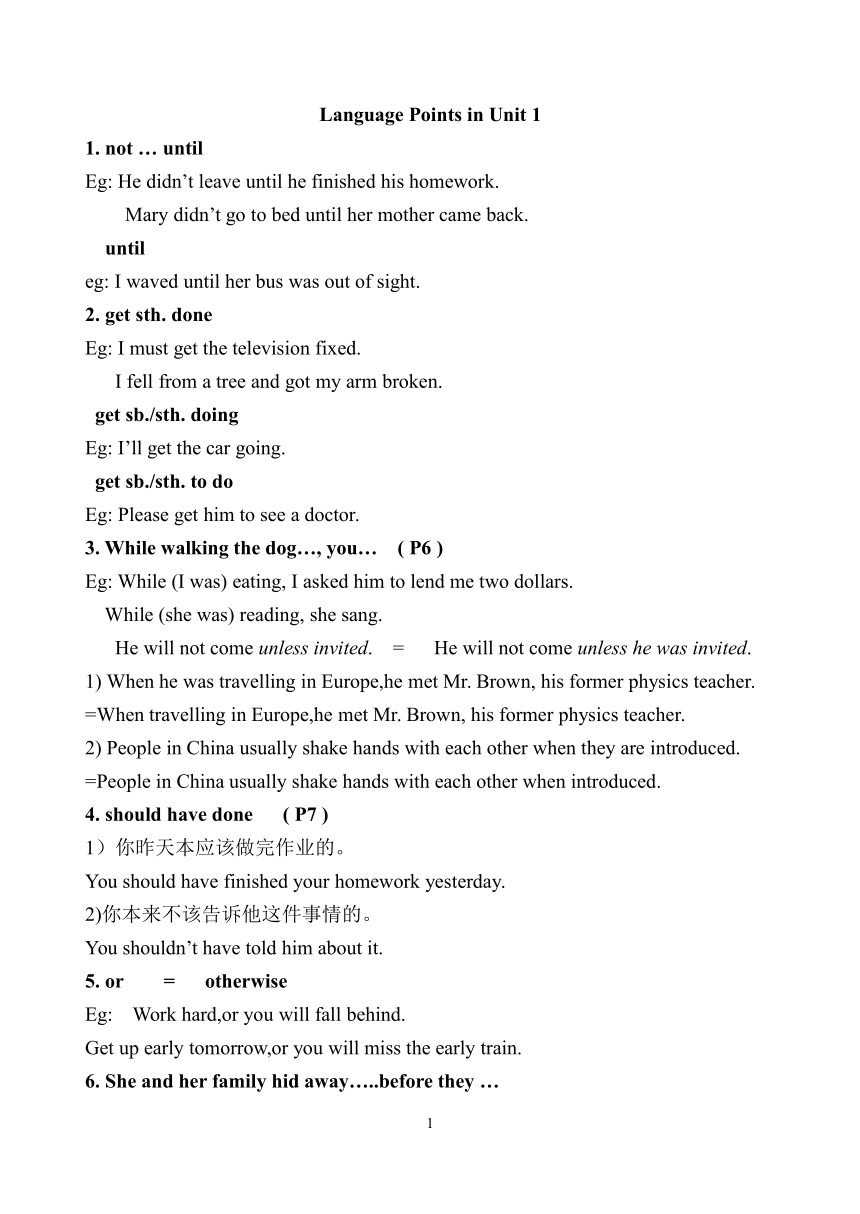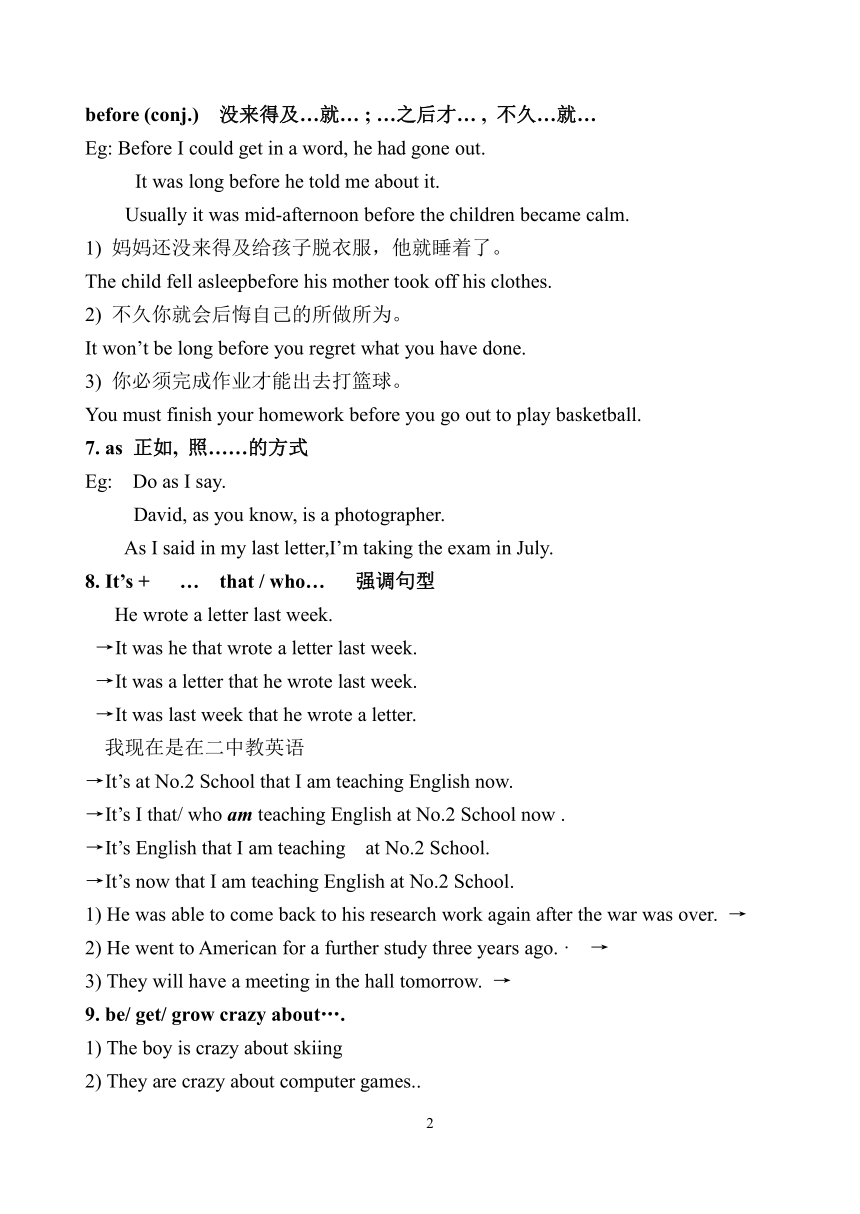Unit 1 Friendship language points
文档属性
| 名称 | Unit 1 Friendship language points |

|
|
| 格式 | rar | ||
| 文件大小 | 11.9KB | ||
| 资源类型 | 教案 | ||
| 版本资源 | 人教版(新课程标准) | ||
| 科目 | 英语 | ||
| 更新时间 | 2009-09-23 20:45:00 | ||
图片预览


文档简介
Language Points in Unit 1
1. not … until
Eg: He didn’t leave until he finished his homework.
Mary didn’t go to bed until her mother came back.
until
eg: I waved until her bus was out of sight.
2. get sth. done
Eg: I must get the television fixed.
I fell from a tree and got my arm broken.
get sb./sth. doing
Eg: I’ll get the car going.
get sb./sth. to do
Eg: Please get him to see a doctor.
3. While walking the dog…, you… ( P6 )
Eg: While (I was) eating, I asked him to lend me two dollars.
While (she was) reading, she sang.
He will not come unless invited. = He will not come unless he was invited.
1) When he was travelling in Europe,he met Mr. Brown, his former physics teacher.
=When travelling in Europe,he met Mr. Brown, his former physics teacher.
2) People in China usually shake hands with each other when they are introduced.
=People in China usually shake hands with each other when introduced.
4. should have done ( P7 )
1)你昨天本应该做完作业的。
You should have finished your homework yesterday.
2)你本来不该告诉他这件事情的。
You shouldn’t have told him about it.
5. or = otherwise
Eg: Work hard,or you will fall behind.
Get up early tomorrow,or you will miss the early train.
6. She and her family hid away…..before they …
before (conj.) 没来得及…就… ; …之后才… , 不久…就…
Eg: Before I could get in a word, he had gone out.
It was long before he told me about it.
Usually it was mid-afternoon before the children became calm.
1) 妈妈还没来得及给孩子脱衣服,他就睡着了。
The child fell asleepbefore his mother took off his clothes.
2) 不久你就会后悔自己的所做所为。
It won’t be long before you regret what you have done.
3) 你必须完成作业才能出去打篮球。
You must finish your homework before you go out to play basketball.
7. as 正如, 照……的方式
Eg: Do as I say.
David, as you know, is a photographer.
As I said in my last letter,I’m taking the exam in July.
8. It’s + … that / who… 强调句型
He wrote a letter last week.
→It was he that wrote a letter last week.
→It was a letter that he wrote last week.
→It was last week that he wrote a letter.
我现在是在二中教英语
→It’s at No.2 School that I am teaching English now.
→It’s I that/ who am teaching English at No.2 School now .
→It’s English that I am teaching at No.2 School.
→It’s now that I am teaching English at No.2 School.
1) He was able to come back to his research work again after the war was over. →
2) He went to American for a further study three years ago. · →
3) They will have a meeting in the hall tomorrow. →
9. be/ get/ grow crazy about….
1) The boy is crazy about skiing
2) They are crazy about computer games..
be crazy to do sth
1) You are crazy to do such a thing.
2) You are crazy to buy a car at such a high price.
= It’s crazy of you to buy a car at such a high price.
10. could have done表对过去可能发生的事的一种猜测。译成“可能做过某事”。
“can't / couldn’t+have+done”表示对过去事情的否定推测,译成“不可能做过某事”。
Eg: He could have come yesterday, but I'm not sure.
Mr. Smith can't have gone to Beijing, for I saw him in the library just now.
1) I didn’t see her in the meeting room this morning. She could’t have spoken at the meeting .
2).He can’t have finished the work so soon.
11. stay (link v) + adj/ n ( keep,remain,grow,)
1) I stayed awake through the stormy night.
2) He stayed single all his life.
3) The weather stayed hot.
4) Stay seated!坐在那别动!
12. much too + adj/ adv
too much (+ un) = more than enough
eg: She is afraid that the trip will be too much for me.
He doesn’t talk too much.
The dress is much too long for me.
It’s much too hot.
too much / much too / too many
1. Eating ________ fat and sugar will easily make you fat.
2. The box is _________ heavy for such a boy like you, I’m afraid.
3. There are __________ sheep on the hill, so it is difficult to count them.
13. But as the moon gave far too much light, I didn’t dare open a window.
dare具有一般动词和情态动词两种用法。
1) 作为一般动词,在肯定句中的dare, dares, dared之后,不定式一般加to。
He dares to do most things, but he doesn’t dare to do this.
He dared to do that and something even worse.
2) 作为情态动词,在否定句中和疑问句中的dare之后,不加to。
We could see he dared not tell the truth.
Dare she tell them what she knows
How dare you say so
3) 在用do或does构成的否定句和疑问句中,理论上虽然应当有to, 实际使用却经常把to省略.
We did not dare (to) tell him that he had failed again this time.
Does he dare (to) go out at night in such stormy weather
14. happen vi.
1) What time did the accident happen
2) No one knows who had fired the gun— it all happened so quickly.
sb. happen to do sth. (似乎)碰巧 = to be or as if by chance
eg: I happened to see her on my way to work.
If you happen to find it, please let me know.
It happens/ happened that clause
Eg: It happened that they went out when I called.
太巧了,我身上没带钱。
___ ____ _________ _____ I had no money _______ me.
I __________ ____ ________ no money _______ me.
15. hold/ have sb in one’s power 控制住/ 摆布某人
16. It’s the first/ second time that … 某人第一/二次做(从句的谓语动词需用完成时态)
Eg: It is the first time that I have visited that city.
It was the first time that I had visited that city.
1) Is this the first time you have been to Beijing.
2) 那是她第一次参观这家工厂。
It _____ the first time that she ____ _______the factory
PAGE
1
1. not … until
Eg: He didn’t leave until he finished his homework.
Mary didn’t go to bed until her mother came back.
until
eg: I waved until her bus was out of sight.
2. get sth. done
Eg: I must get the television fixed.
I fell from a tree and got my arm broken.
get sb./sth. doing
Eg: I’ll get the car going.
get sb./sth. to do
Eg: Please get him to see a doctor.
3. While walking the dog…, you… ( P6 )
Eg: While (I was) eating, I asked him to lend me two dollars.
While (she was) reading, she sang.
He will not come unless invited. = He will not come unless he was invited.
1) When he was travelling in Europe,he met Mr. Brown, his former physics teacher.
=When travelling in Europe,he met Mr. Brown, his former physics teacher.
2) People in China usually shake hands with each other when they are introduced.
=People in China usually shake hands with each other when introduced.
4. should have done ( P7 )
1)你昨天本应该做完作业的。
You should have finished your homework yesterday.
2)你本来不该告诉他这件事情的。
You shouldn’t have told him about it.
5. or = otherwise
Eg: Work hard,or you will fall behind.
Get up early tomorrow,or you will miss the early train.
6. She and her family hid away…..before they …
before (conj.) 没来得及…就… ; …之后才… , 不久…就…
Eg: Before I could get in a word, he had gone out.
It was long before he told me about it.
Usually it was mid-afternoon before the children became calm.
1) 妈妈还没来得及给孩子脱衣服,他就睡着了。
The child fell asleepbefore his mother took off his clothes.
2) 不久你就会后悔自己的所做所为。
It won’t be long before you regret what you have done.
3) 你必须完成作业才能出去打篮球。
You must finish your homework before you go out to play basketball.
7. as 正如, 照……的方式
Eg: Do as I say.
David, as you know, is a photographer.
As I said in my last letter,I’m taking the exam in July.
8. It’s + … that / who… 强调句型
He wrote a letter last week.
→It was he that wrote a letter last week.
→It was a letter that he wrote last week.
→It was last week that he wrote a letter.
我现在是在二中教英语
→It’s at No.2 School that I am teaching English now.
→It’s I that/ who am teaching English at No.2 School now .
→It’s English that I am teaching at No.2 School.
→It’s now that I am teaching English at No.2 School.
1) He was able to come back to his research work again after the war was over. →
2) He went to American for a further study three years ago. · →
3) They will have a meeting in the hall tomorrow. →
9. be/ get/ grow crazy about….
1) The boy is crazy about skiing
2) They are crazy about computer games..
be crazy to do sth
1) You are crazy to do such a thing.
2) You are crazy to buy a car at such a high price.
= It’s crazy of you to buy a car at such a high price.
10. could have done表对过去可能发生的事的一种猜测。译成“可能做过某事”。
“can't / couldn’t+have+done”表示对过去事情的否定推测,译成“不可能做过某事”。
Eg: He could have come yesterday, but I'm not sure.
Mr. Smith can't have gone to Beijing, for I saw him in the library just now.
1) I didn’t see her in the meeting room this morning. She could’t have spoken at the meeting .
2).He can’t have finished the work so soon.
11. stay (link v) + adj/ n ( keep,remain,grow,)
1) I stayed awake through the stormy night.
2) He stayed single all his life.
3) The weather stayed hot.
4) Stay seated!坐在那别动!
12. much too + adj/ adv
too much (+ un) = more than enough
eg: She is afraid that the trip will be too much for me.
He doesn’t talk too much.
The dress is much too long for me.
It’s much too hot.
too much / much too / too many
1. Eating ________ fat and sugar will easily make you fat.
2. The box is _________ heavy for such a boy like you, I’m afraid.
3. There are __________ sheep on the hill, so it is difficult to count them.
13. But as the moon gave far too much light, I didn’t dare open a window.
dare具有一般动词和情态动词两种用法。
1) 作为一般动词,在肯定句中的dare, dares, dared之后,不定式一般加to。
He dares to do most things, but he doesn’t dare to do this.
He dared to do that and something even worse.
2) 作为情态动词,在否定句中和疑问句中的dare之后,不加to。
We could see he dared not tell the truth.
Dare she tell them what she knows
How dare you say so
3) 在用do或does构成的否定句和疑问句中,理论上虽然应当有to, 实际使用却经常把to省略.
We did not dare (to) tell him that he had failed again this time.
Does he dare (to) go out at night in such stormy weather
14. happen vi.
1) What time did the accident happen
2) No one knows who had fired the gun— it all happened so quickly.
sb. happen to do sth. (似乎)碰巧 = to be or as if by chance
eg: I happened to see her on my way to work.
If you happen to find it, please let me know.
It happens/ happened that clause
Eg: It happened that they went out when I called.
太巧了,我身上没带钱。
___ ____ _________ _____ I had no money _______ me.
I __________ ____ ________ no money _______ me.
15. hold/ have sb in one’s power 控制住/ 摆布某人
16. It’s the first/ second time that … 某人第一/二次做(从句的谓语动词需用完成时态)
Eg: It is the first time that I have visited that city.
It was the first time that I had visited that city.
1) Is this the first time you have been to Beijing.
2) 那是她第一次参观这家工厂。
It _____ the first time that she ____ _______the factory
PAGE
1
